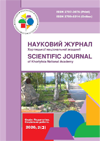UDC: 378: 376-051 (043.3) DEVELOPMENT OF INCLUSIVE COMPETENCIES IN FUTURE SPECIAL EDUCATION TEACHERS WHEN STUDYING FOR MASTER'S DEGREE
DOI: https://doi.org/10.51706/2707-3076-2020-3-11
Abstract
The article is devoted to the problem of inclusive competencies development in future special
education teachers when studying for Master’s Degree.
The authors understand the development of inclusive-oriented competencies in future special
education teachers and teacher assistants as a process of natural changing of a personality due to their own
activity. There are quantitative, qualitative, and structural transformations in the heart of this process that
characterize an individual as a subject of any professional activity and involve the special professional
competencies formation. The components providing positive dynamics for the process of inclusive-oriented
competencies development in future special education teachers and teacher assistants in the system of
university education have been identified. The pedagogical conditions promoting the mentioned competencies
development when studying for the Master's degree were identified. The competence approach focuses rather
on the ability to solve any problems arising in various situations of future professional activities in the inclusive
educational environment.
The development of inclusive competencies in special education students acquiring their Master's
degree is presented as a complex process; its dynamics is defined by an individual’s gradual transition to the
following levels: scientific-cognitive project-modeling activity-creative. The selected levels are delimited
according to the professional awareness expression degree, which is generally determined by special
competencies (such as inclusive competence) development. The last indicates the ability of Master’s degree
students to perform future professional responsibilities in the conditions of inclusion.
A conceptual model for inclusive competencies development in higher education students according to
the structure of the "four-dimensional model" of UNESCO has been proposed. It aims to rationally combine
self-determination and self-awareness of early career professionals with value orientations formation,
improving professional competencies, creative thinking, adequate self-esteem and awareness of modern
philosophy in the context of understanding that all children are valuable members of the society and possess
equal rights, in particular with regard to education, despite the peculiarities of their psychophysical
development.


